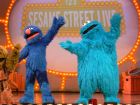Fuzzy And Blue (And Orange)
簡介
入選 Sesame Street 「Platinum All-Time Favorites」 的一首經典曲目,古怪的毛絨怪物們隨着百老匯風格的優雅曲調,載歌載舞地表達着自信。歌詞簡單、重複,適合ESL教學,不過旋律的婉轉有些難度。
歌詞
(Grover) Fuzzy and blue
That's me, I'm fuzzy and blue
It's just the way that I grew
Love being fuzzy and blue
I do!
I'm fuzzy and blue
You see I'm fuzzy and blue
Yeah, me I'm happy to be
So fuzzy and blue
(Herry Monster) Me too!
I'm fuzzy and blue
I'm oh so fuzzy and blue
No other color will do
Not when I'm beautifully blue
(Grover) It's true
He's fuzzy and blue
(Herry Monster) All over
(Grover) Fuzzy and blue
(Herry Monster) Like Grover
(Grover and Herry Monster) Look at us two
We're fuzzy and blue
Fuzzy and blue
(Herry Monster) I'm blue
(Grover) I'm fuzzy
(Grover and Herry Monster) Fuzzy and blue
(Grover) I'm blue
(Herry Monster) He's fuzzy
(Grover and Herry Monster) How do you do?
We're fuzzy and blue
(Cookie Monster) Yoo-hoo!
Fuzzy and blue, me said me fuzzy and blue
From head to bottom of shoe
That right, me fuzzy and blue
(Grover, Herry Monster and Cookie Monster) Me too!
We're fuzzy and blue
Yippee, we're fuzzy and blue
We three, oh, don't you wish you were fuzzy and blue?
Frazzle: {grumbling}
Grover: [Frazzle, you are not fuzzy and blue
You are fuzzy and orange]
Frazzle: {grumbling}
Grover: [All right, all right; just thought I'd mention it
Hit it boys!]
(All) Fuzzy and blue (and orange)
We all are fuzzy and blue (and orange)
Love bein' fuzzy and blue (and orange)
Whatever we do ...
(Herry Monster) Is everybody fuzzy?
(All) Fuzzy and blue
We're fuzzy and blue.
語言點講解
a. fuzzy: If something is fuzzy, it is covered with soft, fine hair or fur. We can say a cat is fuzzy, or a toy bear is fuzzy.
b. "It's just the way that I grew.": Everyday we are growing. You are growing bigger and stronger and smarter. It is the way that you grow. But for the muppets, they have grown to be fuzzy and blue. So he said, "it's just the way that I grew." Is he happy to be like this? ... Yes, because he said, "Love being fuzzy and blue, I do! "
c. "Love being fuzzy and blue, I do! " When you put a "do" before the verb in a sentence, you are expressing a very strong emotion. For example. I love ice cream. I do love ice cream! I love English. I do love English. Grover said, "I do love being fuzzy and blue!" He also said, "Yeah, me I'm happy to be", which means "I'm happy to be me." Read after me: I'm happy to be me.
d. "No other color will do": If something will do, it will work, it will be OK, and it will be useful. If something will NOT do, it will not work, will not be OK, will not be useful. When Herry Monster sings, "no other color will do", what is other color? Herry Monster is blue and he loves being blue, not red, not yellow, not green, but blue. So he thinks, red will not do, yellow will not do. No other color will do. What color will do? (Blue)
e. "me said me fuzzy and blue": This sentence is not correct, it is a baby talk. What should we say in a correct way? ...I said I am fuzzy and blue.
f. "From head to bottom of shoe": Where is your head? Point to your head. Where is the bottom of your shoe? Show me the bottom of your shoe!
g. "That right, me fuzzy and blue " Look at this sentence, there is a mistake in it. Can you find it out? (That's right)
h. "We're fuzzy and blue": When Grover sings alone, he sings "I am fuzzy and blue." But when he and his friends sing together, they sing "we are fuzzy and blue."
i. "don't you wish you were fuzzy and blue?" When you wish to be someone, or something right now, though you know it is impossible, you can say "I wish I were..." For example, if you are very late, and the teacher is very angry, every other student is looking at you. You might say,"Oh, I wish I were invisible." Or "I wish I were a bird so that I can fly very fast."
j. "don't you...": We often ask questions like "do you..." but why it is "don't you" here? When you ask "do you", or "are you", or "will you", you are actually asking a questioin. You don't know what the person you ask will say. She might say yes or no. However, when you ask "don't you", or "aren't you" or "won't you", it means you are very sure that the person you ask will answer "yes". For example, if you are going to the zoo, and you know your little sister will love to come with you, you can say "won't you come with me?", because you know she will definitely say "yes!" Or if you meet two classmates who look very much like each other, you may ask "aren't you twins?", because you know they are very likely to answer "yes." Or if one of your friends loves ice cream very much, and you happen to have one, you might say "don't you want some?" because you know he will say "yes!"
語音(Phonics)
a. Finding the rhyming words in the song. If two words rhyme, they end with the same sound. (blue, grew, do, too, shoe, two)
b. Practicing rhyming with other color words: What rhymes with yellow? (low, go, no, toe, so ) What rhymes with red? (bed, head, Ted, said)
c. "oo" sound: too, zoo, cool, school, pool, food, room, broom, zoo, moo, moon, rooster, tooth, noodle (注意區別:look, good, foot, cook, book)
==
多媒體==
Fuzzy And Blue (And Orange)
